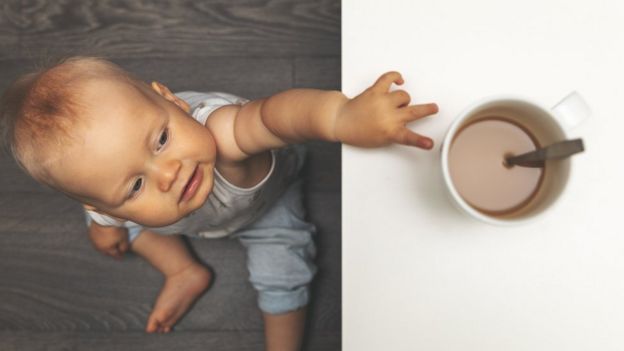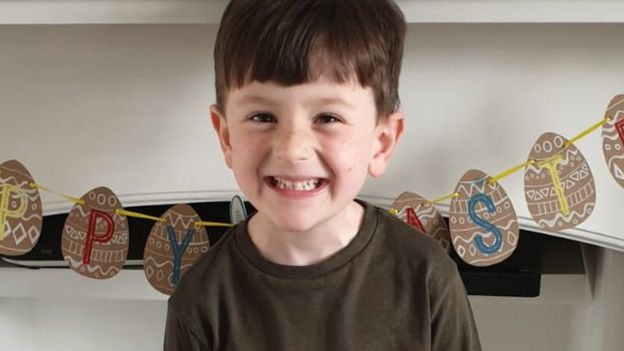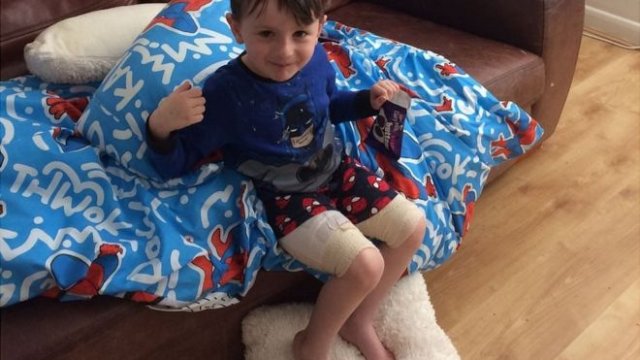Scott Gray had made a cup of tea at home and left it on the side while playing with his sons, four-year-old Archie and two-year-old Freddie.
Moments later, Archie had knocked the tea off the side and on to himself.
Scott said: “I pulled his trousers and his skin came off too. It was horrendous. It happened so fast. It was only on him for one or two seconds.”
Each year hundreds of UK toddlers, like Archie, end up in hospital with severe but avoidable coffee and tea scalds.
But thanks to Scott’s quick thinking and action – plunging Archie’s legs into cold running water in the bath and keeping him there while the ambulance arrived – Archie’s thigh burns could be treated without a skin graft and he’s been left with no scars, say surgeons.
Almost half of child admissions to specialised burn NHS services in the past five years in England and Wales, some 17,052, involved children who had been scalded by hot food or liquid spillages.

Keep hot drinks and hot food out of a child’s reach
In 2018, there were 6,645 child admissions to designated specialised burn services in England and Wales.
More than 3,100 of these burns to children involved spillages from hot food or drink, and more than half of these involved children aged two or younger.
Plastic surgeons from the Royal College of Surgeons of England and the British Burn Association say the way a burn is treated in the first few seconds and minutes is crucial to a child’s recovery.
Scott acted immediately and removed Archie’s clothing and put him under running cold water.
How to treat a scald:
- Cool the burn with running cold tap water for 20 minutes and remove all clothing and jewellery (unless it is melted or firmly stuck to the wound)
- Call for help for any burn larger than a 50p coin: 999, 111 or your local GP for advice
- Cover with cling film or a sterile, non-fluffy dressing or cloth. Make sure the patient is kept warm
Scott said: “I’ve done first aid training, but n
othing specifically related to burns, I just used my head and thought that if cold water works for a burnt finger or hand, then it must work for legs also – at the time I didn’t know for sure I was taking the right action.”
Archie, who lives with his family in Berkshire, was treated at the specialist burns unit at Stoke Mandeville Hospital.
His doctor, Mike Tyler, whom Archie and his dad affectionately call Batman because he is their “superhero”, said: “This is exactly the type of injury where good first aid with cooling can make a real difference to the outcome. Archie had scalded 5% of his body surface area and typically children with this size of burn may well require a
skin grafting operation to the worst-affected areas and some form of lifelong scarring is common. I prepared Archie’s parents for this.”
But Archie’s legs healed well and he was discharged without any scars.

THE GRAY FAMILY
“I am convinced that Scott’s actions saved Archie from either an operation or a prolonged period of dressings and prevented him from having scarred legs. We regularly see children with such injuries, yet many people don’t understand the benefits of cooling the burn straightaway. I’m extremely keen to get the message
out that placing the skin in cold water for 20 minutes can have a dramatic impact on the outcome of the injury,” he said.
Scott said: “It was an accident but I blamed myself for a long time because it happened under my care. But I can take a little bit of happiness knowing that the first aid that I carried out made a difference.”
To prevent burns from happening in the home, the British Burn Association advises the public:
DO
- Run COLD water first in the bath or sink before adding hot water – test the temperature
- Keep saucepans at the back of the stove NOT near the front – turn handles to the back
- Keep hot drinks out of a child’s reach
- DON’T
- Drink hot drinks while nursing a baby or child
- Put a baby or child into a bath or sink until the water has been tested
- Warm baby bottles in microwaves
- Leave children unattended in the kitchen
Source: BBC


Comments are closed.